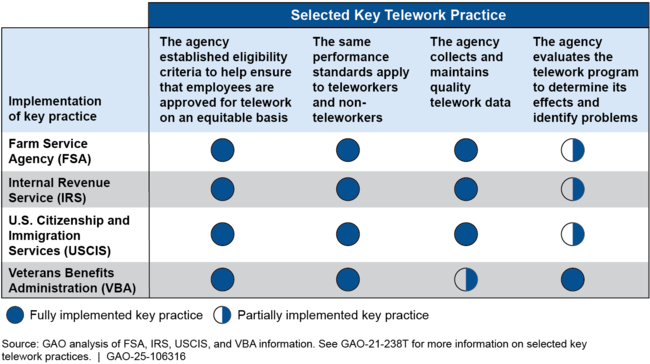Federal Telework: Selected Agencies Need to Evaluate the Potential Effects on Agency Performance
Fast Facts
This report—the first in a series—looks at how 4 agencies implemented telework and how it affected their operations, performance, and more during and after the COVID-19 pandemic.
All the agencies implemented three of the four telework practices we looked for, such as establishing eligibility criteria to ensure teleworking employees are approved equitably.
But some agencies haven't yet evaluated telework's effect on their ability to provide public services. Officials at selected agencies said factors other than telework affected their mission performance.
Our recommendations address issues with how agencies implemented and evaluated telework.

Highlights
What GAO Found
Telework use from fiscal years 2019 through 2023 varied among four selected federal agencies GAO reviewed: Farm Service Agency (FSA), Internal Revenue Service (IRS), U.S. Citizenship and Immigration Services (USCIS), and Veterans Benefits Administration (VBA). Most recently, for example, following reentry, telework use at FSA was at 11 percent of total hours worked, while at VBA telework use was around 66 percent. Officials from the selected agencies cited factors that affected how many and how often employees could telework, including agencywide in-office requirements, work portability and the need to meet in person with the public, supervisory status, and location. The selected agencies have taken steps to facilitate telework and teleworking employee interactions with the public, such as expanding online document submission services and providing virtual online appointments.
Agency officials told GAO that changes in telework use affected recruitment, hiring, and retention in various ways. For example, IRS officials said that telework helped the agency recruit customer service representatives (CSR) by expanding the potential talent pool to people who lived further away from agency locations. USCIS's analysis of its hiring data found telework availability significantly increased applicant interest in positions. FSA officials said that limited telework availability likely contributed to recruitment and retention challenges, but pay and workload issues were more important factors.
Officials at the selected agencies cited various factors as influencing changes in customer service performance. For example,
- Other factors besides telework were identified as contributing to call wait times and correspondence backlogs. The percentage of taxpayers who received telephone assistance from an IRS CSR and associated call wait times improved from 2022 to 2023. IRS staff teleworked a majority of the time in both years. IRS officials told GAO the improvements were primarily due to additional staffing and technology upgrades following passage of the Inflation Reduction Act of 2022. Similarly, they attributed persistent backlogs in taxpayer correspondence to other issues besides telework, such as the partial shutdown of a major records center during the COVID-19 pandemic.
- Factors other than telework were cited for changes in processing times and timeliness of veteran's education and disability claims decisions. Processing times for veteran's education claims improved from fiscal years 2019 through 2023 at VBA, a period when telework use increased. Agency officials attributed these improvements to additional flexibilities to hire staff following passage of the statute commonly referred to as the PACT Act, and increased automation. VBA officials cited a temporary closure of Federal Records Centers during the pandemic and a substantial increase in workload—rather than telework use—as reasons why the timeliness of disability claim decisions declined.
As shown in the figure, agencies fully or partially met four selected key practices for a successful telework program.
Agencies' Telework Programs Varied in Their Alignment with Selected Key Practices for Implementation of Successful Federal Telework Programs

In general, each of the agencies had a tracking system that provided accurate participation rates and other information about teleworkers and the program, such as a formal headcount of teleworkers and the extent to which they teleworked. However, VBA does not yet have a system to easily and reliably access telework agreement information, which is necessary to maintain quality telework data. Department of Veterans Affairs (VA) officials said that VBA has identified a technology solution to expand its capability to electronically extract usable telework data directly from telework agreement forms, and expects to complete implementation by December 2024. Until VBA completes this action, the agency is missing an opportunity to manage and oversee its telework program more efficiently.
Each of the four agencies took steps to identify problems with the telework program, such as through compliance reviews. VBA identified performance indicators it will use to annually evaluate the effects telework and other factors have on agency performance.
FSA, IRS, and USCIS have not yet evaluated telework's role in agency performance outcomes for a variety of reasons. For example, USCIS officials explained that the reason for not conducting an evaluation was largely because of the complexity of identifying how telework alone affects performance. FSA officials said that they have not conducted an evaluation in part because they were unsure of what indicators to use. They added that FSA's response to requirements in a 2023 Office of Management and Budget memorandum could help it identify indicators to evaluate its telework use, but it was too early to know.
In a future report, GAO plans to describe how the use of telework affected the Bureau of Indian Affairs, Social Security Administration, and the Department of State's ability to provide certain services and evaluate the extent to which these agencies' telework practices and plans aligned with selected key practices for successful telework programs.
GAO will also issue a report on federal use of remote work in 2025. Remote work is a work arrangement where an employee performs work from an alternate worksite (generally the person's residence) and is not expected to report to an agency location on a regular and recurring basis. It is distinct from telework, where workers are expected to report to an agency location on a regular basis and have regularly scheduled days where they work from an alternate worksite.
Why GAO Did This Study
For many years, federal agencies have used telework to help accomplish their missions, manage their operations, and promote work-life balance for their employees. Telework was also essential for many agencies to continue operations and keep federal employees safe during the COVID-19 pandemic.
GAO was asked to review the implications of telework in the federal government. This report is part of a series of reports on telework in the federal government. This report (1) describes how the use of telework has contributed to ongoing changes among selected federal agencies' workforce postures, operations, and organizational health; (2) summarizes how the use of telework—among other factors—may have affected agencies' performance on select customer service indicators; and (3) assesses the extent to which these agencies' telework practices and plans aligned with selected key practices for successful telework programs.
For this report, GAO collected and analyzed the agencies' telework data from July 2019 through December 2023. GAO conducted 26 discussion groups separately with supervisors and non-supervisory staff and interviewed selected agencies' officials. GAO also analyzed agency performance reports and other documents and compared agencies' activities with selected key telework practices identified in GAO-21-238T .
Recommendations
GAO is making four recommendations, including that FSA, IRS, and USCIS evaluate their telework programs to identify problems or issues with the programs and make appropriate adjustments, and assess the effects of telework on agency performance. DHS agreed with the recommendation to USCIS. IRS partially agreed with the recommendation, and USDA did not agree or disagree with the recommendation to FSA. GAO continues to stand by its recommendations.
GAO also recommended that VA require VBA to finish its plan to update its telework system so that it can efficiently extract telework agreement information. VA agreed with the recommendation.
Recommendations for Executive Action
| Agency Affected | Recommendation | Status |
|---|---|---|
| Farm Service Agency | The Administrator of FSA should evaluate FSA's telework program so that the agency can identify problems or issues with the program and make appropriate adjustments, and assess the effects of telework on agency performance. (Recommendation 1) |
When we confirm what actions the agency has taken in response to this recommendation, we will provide updated information.
|
| Internal Revenue Service | The Commissioner of Internal Revenue should evaluate IRS's telework program so that the agency can identify problems or issues with the program and make appropriate adjustments, and assess the effects of telework on agency performance. (Recommendation 2) |
IRS partially agreed with the recommendation. In its response, IRS wrote that a more robust data linkage of existing organizational performance data would identify beneficial or adverse impacts of telework. Further, IRS said it established a collaboration effort with the Veterans Benefits Administration (VBA) to identify best practices in workplace flexibilities and proposed to leverage some of VBA's practices in developing telework performance metrics. In January 2025, the President issued a memorandum directing executive branch departments and agencies to require their employees to work in-person at their duty station on a full-time basis but allowed exemptions where necessary. The Office of Management and Budget and Office of Personnel Management subsequently released guidance implementing this memorandum, which required agencies to prepare an implementation plan that would include the agency's process for determining exceptions based on disability, qualifying medical condition, and or other compelling reasons. In response, on March 8, 2025, IRS cancelled all pre-existing remote work, and frequent and recurring telework agreements. Beginning March 9, IRS required all teleworkers to complete their scheduled work hours at their official worksite with some limited exceptions. On December 10, 2025, IRS canceled all requests for long-term telework use based on hardship exceptions and limited ad hoc telework use (e.g., on days with a medical appointment) to 5 days per calendar year.
|
| United States Citizenship and Immigration Services | The Director of USCIS should evaluate USCIS's telework program so that the agency can identify problems or issues with the program and make appropriate adjustments, and assess the effects of telework on agency performance. (Recommendation 3) |
USCIS concurred with the recommendation at the time the report was issued in November 2024. In March 2025, USCIS told us it could not implement the recommendation because of significant changes to its telework program. Specifically, USCIS told us the Presidential Memorandum "Return to In-Person Work" issued on Jan. 20, 2025, and subsequent guidance from OPM, OMB, the DHS Secretary, and the Acting USCIS Director required all employees to work in an agency office location full time, unless excused from this requirement due to a disability, qualifying medical condition, or other compelling reason certified by the agency head and the employee's supervisor. For this reason, we are closing the recommendation as it is no longer valid. Should USCIS determine that telework and remote work are needed to meet its mission in the future, it remains important that the agency evaluate its effects on its operations and services to the public.
|
| Department of Veterans Affairs | The Under Secretary for Benefits at VA should require VBA to finish its plan to update its telework system so that it can efficiently extract telework agreement information. (Recommendation 4) |
On November 8, 2024, VA updated its telework system so that all telework agreements could be available electronically. On May, 8, 2025, VA's Office of Human Capital Services issued a policy memorandum stating that all agency employee telework agreements need to be requested through and documented in the telework system. Supervisors were required to ensure all current, new, and updated employee telework agreements are documented in the system. VA now has a system and a related policy that will help the agency easily and reliably access telework agreement information, which is necessary to maintain quality telework data. As a result, VA can manage and oversee its telework program more efficiently.
|
